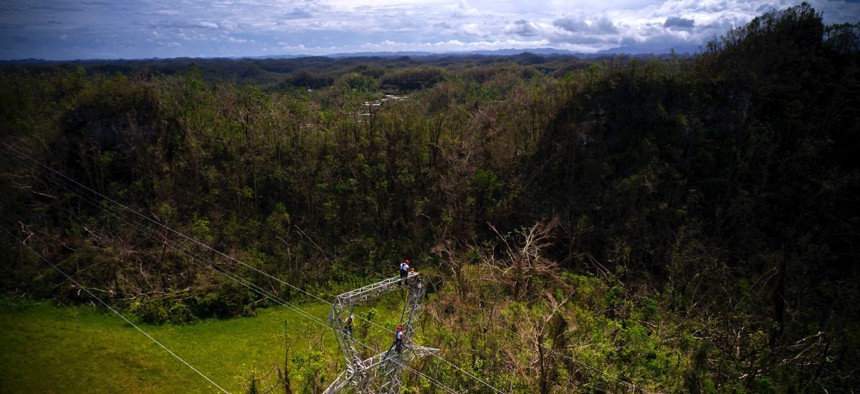Puerto Rico Will Take Over Energy Restoration With or Without Oversight Clarity

Electrical lineman work on transmission towers in October in Barceloneta, Puerto Rico. Ramon Espinosa / AP Photo
With the start of hurricane season a few weeks away, 22,900 island residents still lack power.
WASHINGTON — The U.S. Army Corps of Engineers will transfer energy restoration operations over to the Puerto Rico Electric Power Authority on May 18, amid debate over how best to regulate the public utility.
As of Monday—more than seven months after Hurricane Maria devastated the territory—the Army Corps had restored power to 1.45 million PREPA customers, 98.4 percent, leaving about 22,900 people still without electricity.
Senators at an Energy and Natural Resources Committee hearing Tuesday worried that progress in building a truly resilient electric grid hasn’t been fast enough to prepare Puerto Rico for the Atlantic hurricane season, which begins June 1.
“Our mission wasn’t to build a modern, resilient system,” Ray Alexander, the Army Corps’ contingency operations and homeland security director, told the senators. “Our mission was to do the interim measures to get power restored.”
The Federal Emergency Management Agency involved the Army Corps because Puerto Rico didn’t call for mutual aid until Oct. 31, 41 days after Maria hit, said Bruce Walker, an assistant secretary at the Energy Department.
PREPA is moving from the planning and restoration phase to one of recovery and is currently responsible for rebuilding the grid.
“Puerto Rico needs to change the way the grid is supplied by power today,” said PREPA CEO Walter Higgins. “It is not being adequately and properly supplied with the current generation.”
Maintenance issues, relying too heavily on costly oil imports and energy generation imbalances pose challenges, Higgins added. Alternative solutions like microgrids and solar and emergency generation will need to be explored.
Both Republican and Democratic senators stressed the need for a more stable, independent regulatory structure in Puerto Rico, the Office of the Governor pushing for territorial legislation to sell off some PREPA assets and contract with a third party to operate transmission and distribution lines. The reorganization plan would also dissolve the Puerto Rico Energy Commission, which claims the authority to direct grid policy.
PREC’s interim president, José Román Morales, accused the governor of impeding the commission’s efforts to regulate improved performance of the grid.
Meanwhile, Puerto Rico’s Financial Oversight and Management Board recently certified a privatization plan for PREPA.
“The private sector should be in control,” said Rodrigo Masses, Puerto Rico Manufacturers Association president. “In the past two or three decades we’ve been very much affected by bad and expensive energy.”
PREPA remaining public would mean more brownouts and blackouts costing millions of dollars in lost product, Masses added.
Gov. Ricardo Roselló established the Puerto Rico Fiscal Agency & Financial Advisory Authority in January 2017 to negotiate with creditors on the public debt, ahead of both the island and PREPA filing for bankruptcy in May and June respectively. Christian Sobrino-Vega, FAFAAA’s chairman of the board, said that a new, independent regulator should be created by Puerto Rico’s legislature and staffed with utility regulation experts.
The territorial government is “some distance” away from a decision on that, Higgins said, as well as how PREPA’s bankruptcy will be handled.
“I hope we don’t lose sight of the big picture that Puerto Rico could go from a challenged electrical system to a world leader, given the natural assets that the island has,” said Sen. Angus King, a Maine Independent. “Solar prices have plunged 80 percent since 2010.”
Sen. Martin Heinrich, a New Mexico Democrat, pointed out “Puerto Ricans pay painfully high retail electric rates” because of the territory’s reliance on diesel generation.
Energy Department officials see “strategic opportunities” for solar and wind energy, Walker said.
“The key thing now for us in Puerto Rico is to make sure that the regulatory process does allow for some distributed generation that would help us with resiliency,” said Sen. Maria Cantwell, a Washington Democrat. “If there are barriers to that, I certainly want to know.”
Dave Nyczepir is a News Editor at Government Executive’s Route Fifty and is based in Washington, D.C.
NEXT STORY: Digital forensics library for investigators






